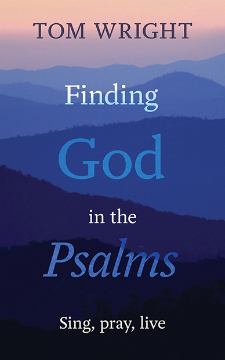Finding God in the Psalms
Tom Wright's call to restore the Psalms to a place of importance in the prayer and spirituality of the Church
Finding God in the Psalms
By Tom Wright
SPCK
ISBN: 978 0281 06989 7
Reviewed by: John Rackley
This is a call to restore the Psalms to a place of importance in the prayer and spirituality of the Church. Tom Wright has read, sung and prayed the psalms from his earliest days and feels their significance. So this is not a technical exploration of authorship, structure or patterns, although he does ponder all three in a way which serves his primary aim that we pray and live the psalms rather than study them.

He provides three helpful guides. First, we must remember that the Psalms are set in a biblical world-view which is very different from that of our present western-culture. It was the world view of Jesus and his contemporaries. They were people who believed that God our creator is a continuing source of influence and direction in what he has made. This was focused in the life and times of the people of Israel. Tom Wright has examined this in more detail in his other work, especially about Jesus and Paul.
Some may find Wright’s regular self-referencing annoying; but it reminds us that he wants this book to be seen as part of the ‘Wright Project’ which has been going on for a number of years. This is an attempt to re-frame Evangelical theology, especially that which comes from North America which has such a strong hold over many spheres in this country. It is not insignificant that this book began as a series of lectures at Calvin College, Grand Rapids.
His second guide frames the Psalms as crossing roads in time, space and matter where we meet God. They compel us to look at what happens from a different perspective. This will at times make them strange and challenging.
So it is important, thirdly to recognise that they are poetry, and what is more, sung poetry. They cannot be read off the page like a recipe book for nourishing spiritual food; they are to be lived, celebrated and inhabited. Their rhythms make us change our stride and slacken our pace – they are to be rushed or scoured for an edifying motto. They are not God’s sound-bites.
To read this book is to read a lot of the psalms. This in itself may be a refreshing experience if we do not know them, because he does not stay with the familiar few.
It is also a pastoral, personal encounter with God. Past, present and future belong to him. We are called to live joyfully and painfully, in the story that is both his and ours. Our times are in his hands.
It is a book to be read slowly – perhaps after the celebration of Pentecost as summer blends into autumn so that we can reflect on the work of God in our lives deeply and without hurry.
The Revd John Rackley is minister of Manvers Street Baptist Church, Bath
Baptist Times, 27/03/2014